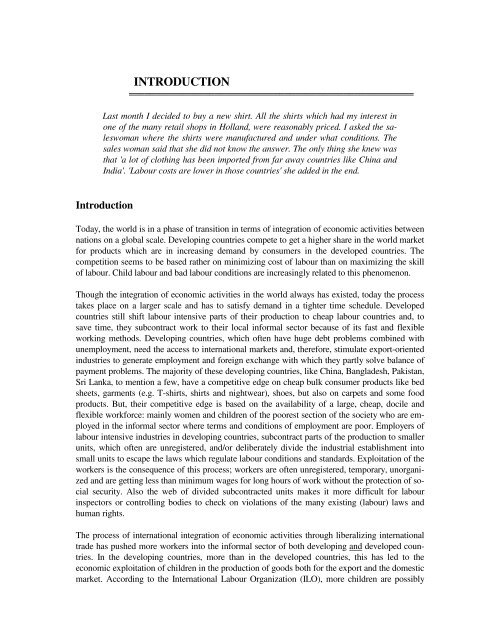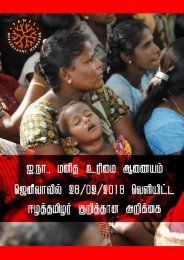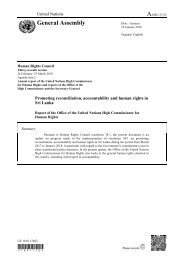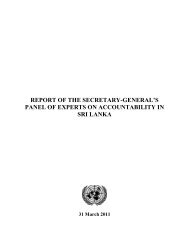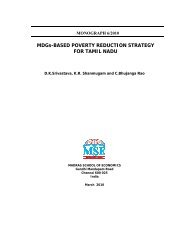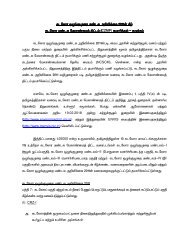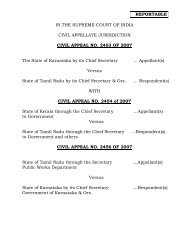You also want an ePaper? Increase the reach of your titles
YUMPU automatically turns print PDFs into web optimized ePapers that Google loves.
INTRODUCTION<br />
═════════════════════════════════════════════════════<br />
Last month I decided to buy a new shirt. All <strong>the</strong> shirts which had my <strong>in</strong>terest <strong>in</strong><br />
one <strong>of</strong> <strong>the</strong> many retail shops <strong>in</strong> Holl<strong>and</strong>, were reasonably priced. I asked <strong>the</strong> saleswoman<br />
where <strong>the</strong> shirts were manufactured <strong>and</strong> under what conditions. The<br />
sales woman said that she did not know <strong>the</strong> answer. The only th<strong>in</strong>g she knew was<br />
that 'a lot <strong>of</strong> cloth<strong>in</strong>g has been imported from far away countries like Ch<strong>in</strong>a <strong>and</strong><br />
<strong>India</strong>'. 'Labour costs are lower <strong>in</strong> those countries' she added <strong>in</strong> <strong>the</strong> end.<br />
Introduction<br />
Today, <strong>the</strong> world is <strong>in</strong> a phase <strong>of</strong> transition <strong>in</strong> terms <strong>of</strong> <strong>in</strong>tegration <strong>of</strong> economic activities between<br />
nations on a global scale. Develop<strong>in</strong>g countries compete to get a higher share <strong>in</strong> <strong>the</strong> world market<br />
for products which are <strong>in</strong> <strong>in</strong>creas<strong>in</strong>g dem<strong>and</strong> by consumers <strong>in</strong> <strong>the</strong> developed countries. The<br />
competition seems to be based ra<strong>the</strong>r on m<strong>in</strong>imiz<strong>in</strong>g cost <strong>of</strong> <strong>labour</strong> than on maximiz<strong>in</strong>g <strong>the</strong> skill<br />
<strong>of</strong> <strong>labour</strong>. <strong>Child</strong> <strong>labour</strong> <strong>and</strong> bad <strong>labour</strong> conditions are <strong>in</strong>creas<strong>in</strong>gly related to this phenomenon.<br />
Though <strong>the</strong> <strong>in</strong>tegration <strong>of</strong> economic activities <strong>in</strong> <strong>the</strong> world always has existed, today <strong>the</strong> process<br />
takes place on a larger scale <strong>and</strong> has to satisfy dem<strong>and</strong> <strong>in</strong> a tighter time schedule. Developed<br />
countries still shift <strong>labour</strong> <strong>in</strong>tensive parts <strong>of</strong> <strong>the</strong>ir production to cheap <strong>labour</strong> countries <strong>and</strong>, to<br />
save time, <strong>the</strong>y subcontract work to <strong>the</strong>ir local <strong>in</strong>formal sector because <strong>of</strong> its fast <strong>and</strong> flexible<br />
work<strong>in</strong>g methods. Develop<strong>in</strong>g countries, which <strong>of</strong>ten have huge debt problems comb<strong>in</strong>ed with<br />
unemployment, need <strong>the</strong> access to <strong>in</strong>ternational markets <strong>and</strong>, <strong>the</strong>refore, stimulate <strong>export</strong>-<strong>oriented</strong><br />
<strong>in</strong>dustries to generate employment <strong>and</strong> foreign exchange with which <strong>the</strong>y partly solve balance <strong>of</strong><br />
payment problems. The majority <strong>of</strong> <strong>the</strong>se develop<strong>in</strong>g countries, like Ch<strong>in</strong>a, Bangladesh, Pakistan,<br />
Sri Lanka, to mention a few, have a competitive edge on cheap bulk consumer products like bed<br />
sheets, <strong>garment</strong>s (e.g. T-shirts, shirts <strong>and</strong> nightwear), shoes, but also on carpets <strong>and</strong> some food<br />
products. But, <strong>the</strong>ir competitive edge is based on <strong>the</strong> availability <strong>of</strong> a large, cheap, docile <strong>and</strong><br />
flexible workforce: ma<strong>in</strong>ly women <strong>and</strong> children <strong>of</strong> <strong>the</strong> poorest section <strong>of</strong> <strong>the</strong> society who are employed<br />
<strong>in</strong> <strong>the</strong> <strong>in</strong>formal sector where terms <strong>and</strong> conditions <strong>of</strong> employment are poor. Employers <strong>of</strong><br />
<strong>labour</strong> <strong>in</strong>tensive <strong>in</strong>dustries <strong>in</strong> develop<strong>in</strong>g countries, subcontract parts <strong>of</strong> <strong>the</strong> production to smaller<br />
units, which <strong>of</strong>ten are unregistered, <strong>and</strong>/or deliberately divide <strong>the</strong> <strong>in</strong>dustrial establishment <strong>in</strong>to<br />
small units to escape <strong>the</strong> laws which regulate <strong>labour</strong> conditions <strong>and</strong> st<strong>and</strong>ards. Exploitation <strong>of</strong> <strong>the</strong><br />
workers is <strong>the</strong> consequence <strong>of</strong> this process; workers are <strong>of</strong>ten unregistered, temporary, unorganized<br />
<strong>and</strong> are gett<strong>in</strong>g less than m<strong>in</strong>imum wages for long hours <strong>of</strong> work without <strong>the</strong> protection <strong>of</strong> social<br />
security. Also <strong>the</strong> web <strong>of</strong> divided subcontracted units makes it more difficult for <strong>labour</strong><br />
<strong>in</strong>spectors or controll<strong>in</strong>g bodies to check on violations <strong>of</strong> <strong>the</strong> many exist<strong>in</strong>g (<strong>labour</strong>) laws <strong>and</strong><br />
human rights.<br />
The process <strong>of</strong> <strong>in</strong>ternational <strong>in</strong>tegration <strong>of</strong> economic activities through liberaliz<strong>in</strong>g <strong>in</strong>ternational<br />
trade has pushed more workers <strong>in</strong>to <strong>the</strong> <strong>in</strong>formal sector <strong>of</strong> both develop<strong>in</strong>g <strong>and</strong> developed countries.<br />
In <strong>the</strong> develop<strong>in</strong>g countries, more than <strong>in</strong> <strong>the</strong> developed countries, this has led to <strong>the</strong><br />
economic exploitation <strong>of</strong> children <strong>in</strong> <strong>the</strong> production <strong>of</strong> goods both for <strong>the</strong> <strong>export</strong> <strong>and</strong> <strong>the</strong> domestic<br />
market. Accord<strong>in</strong>g to <strong>the</strong> International Labour Organization (ILO), more children are possibly


